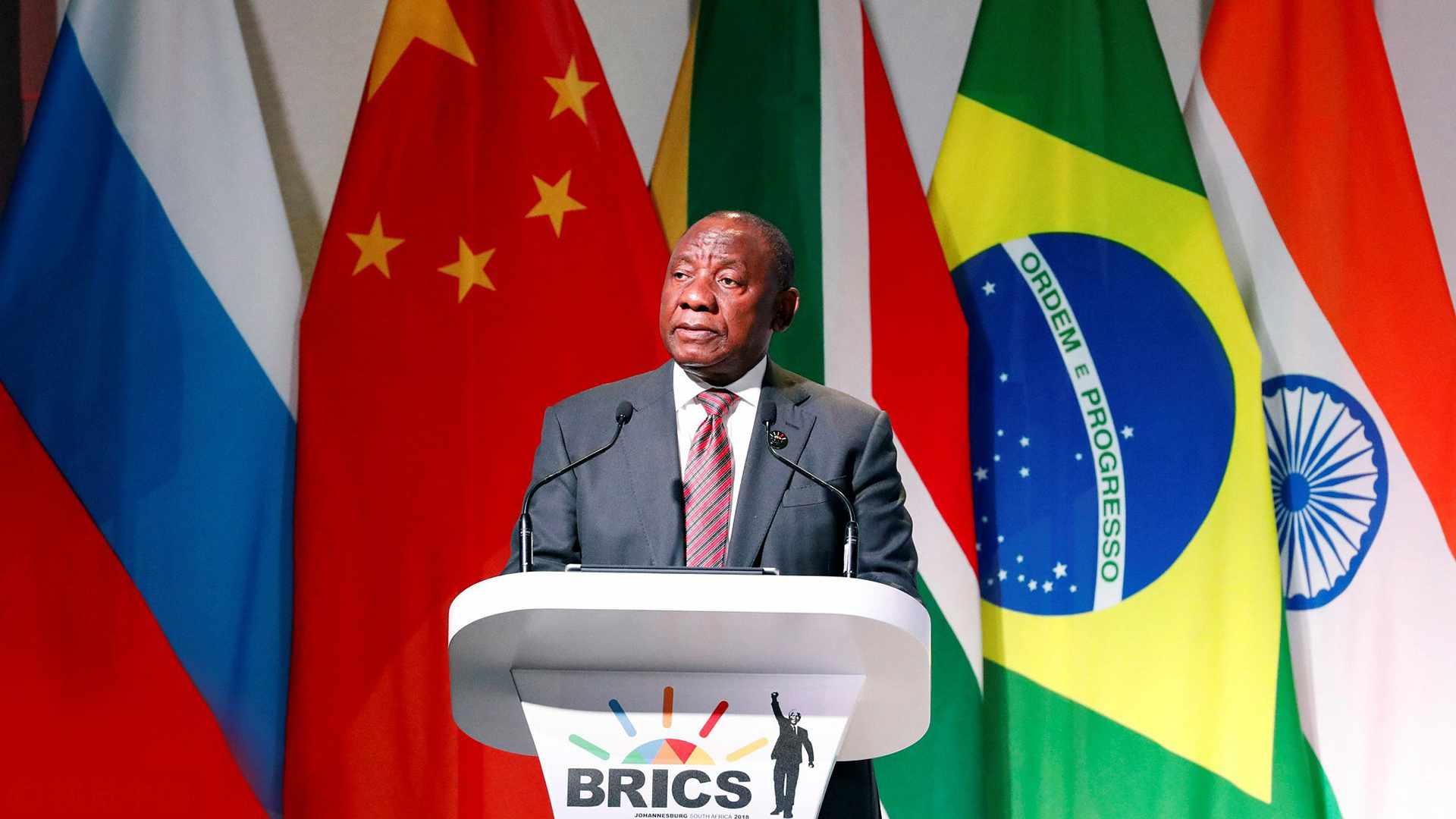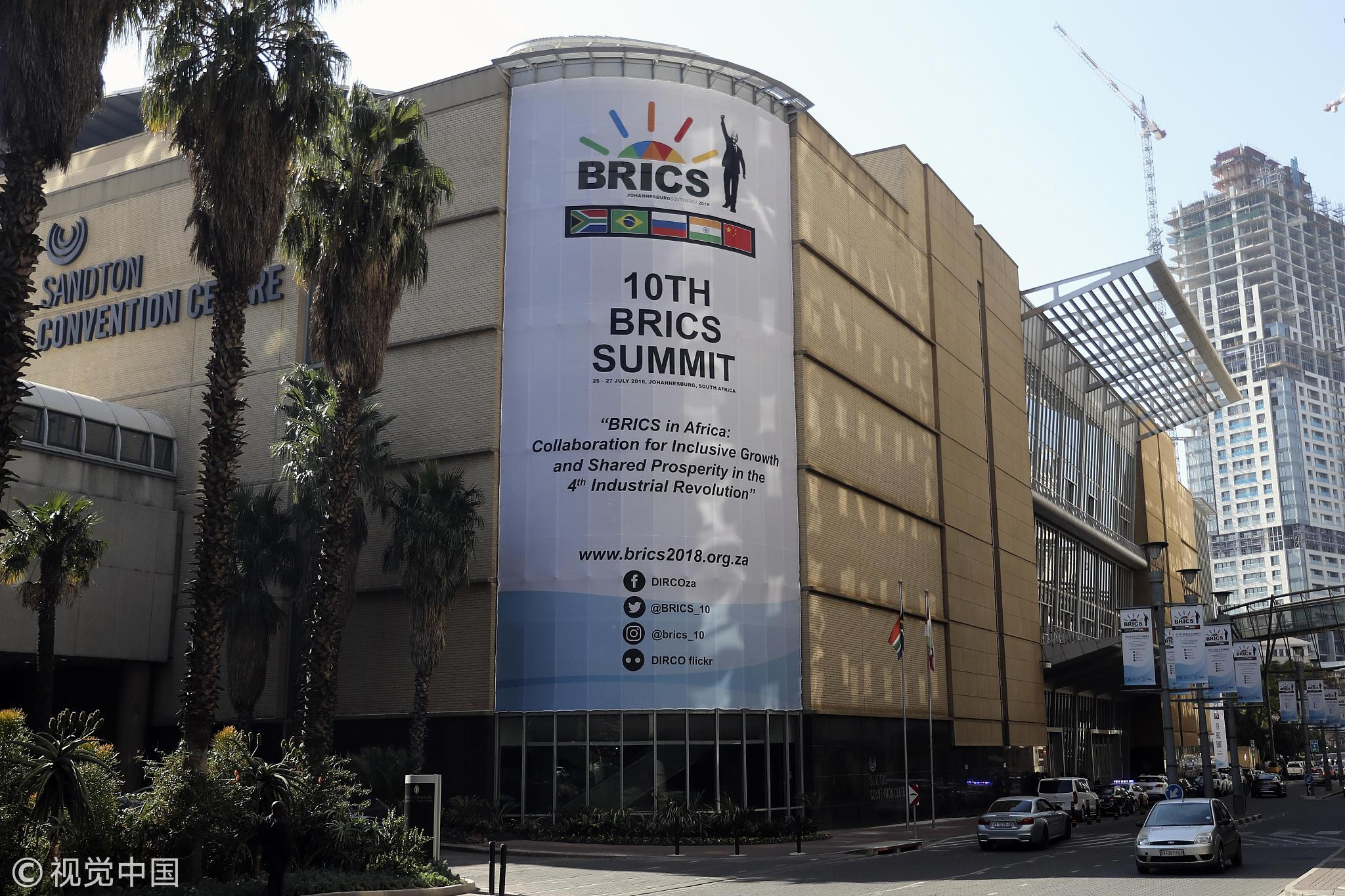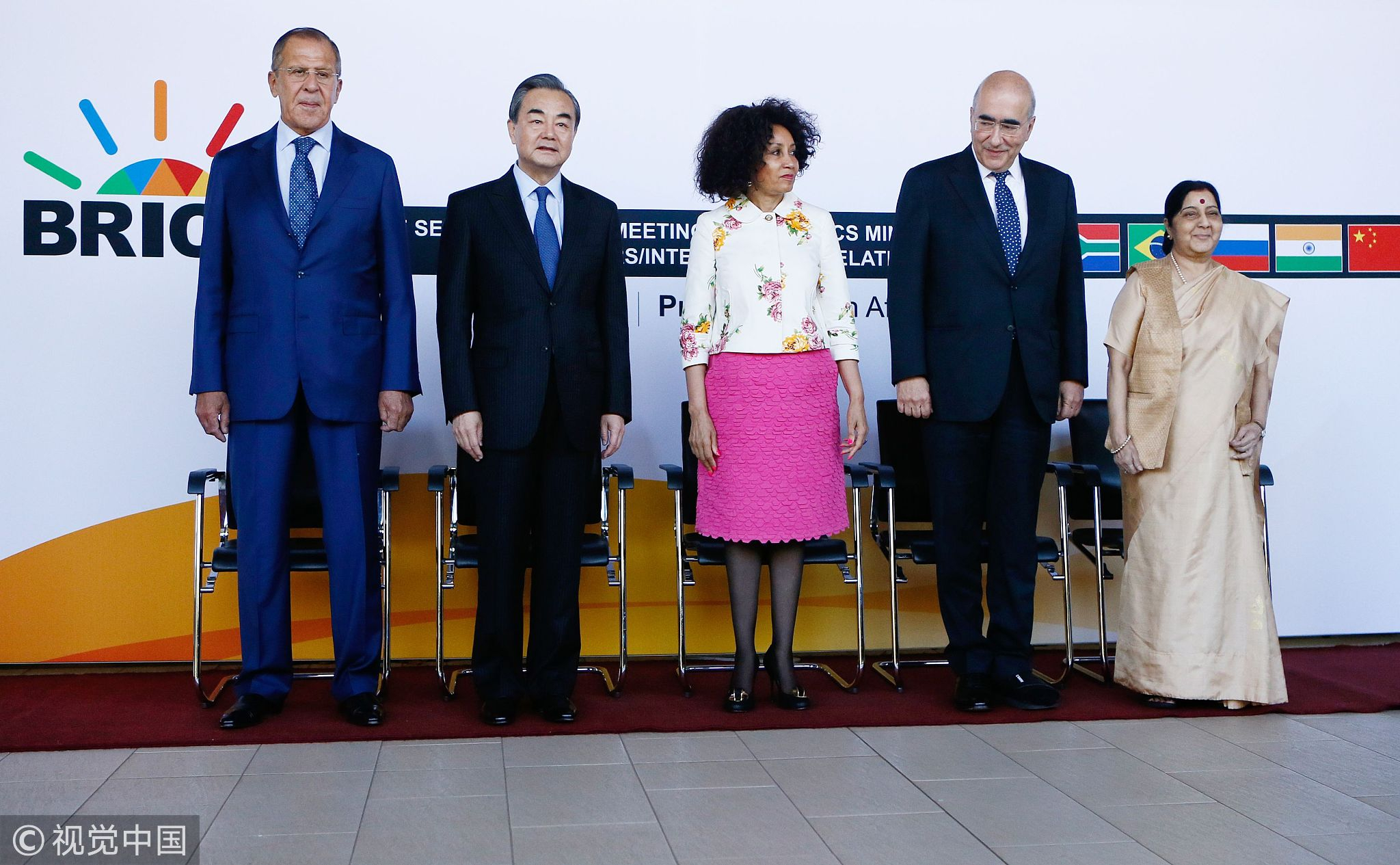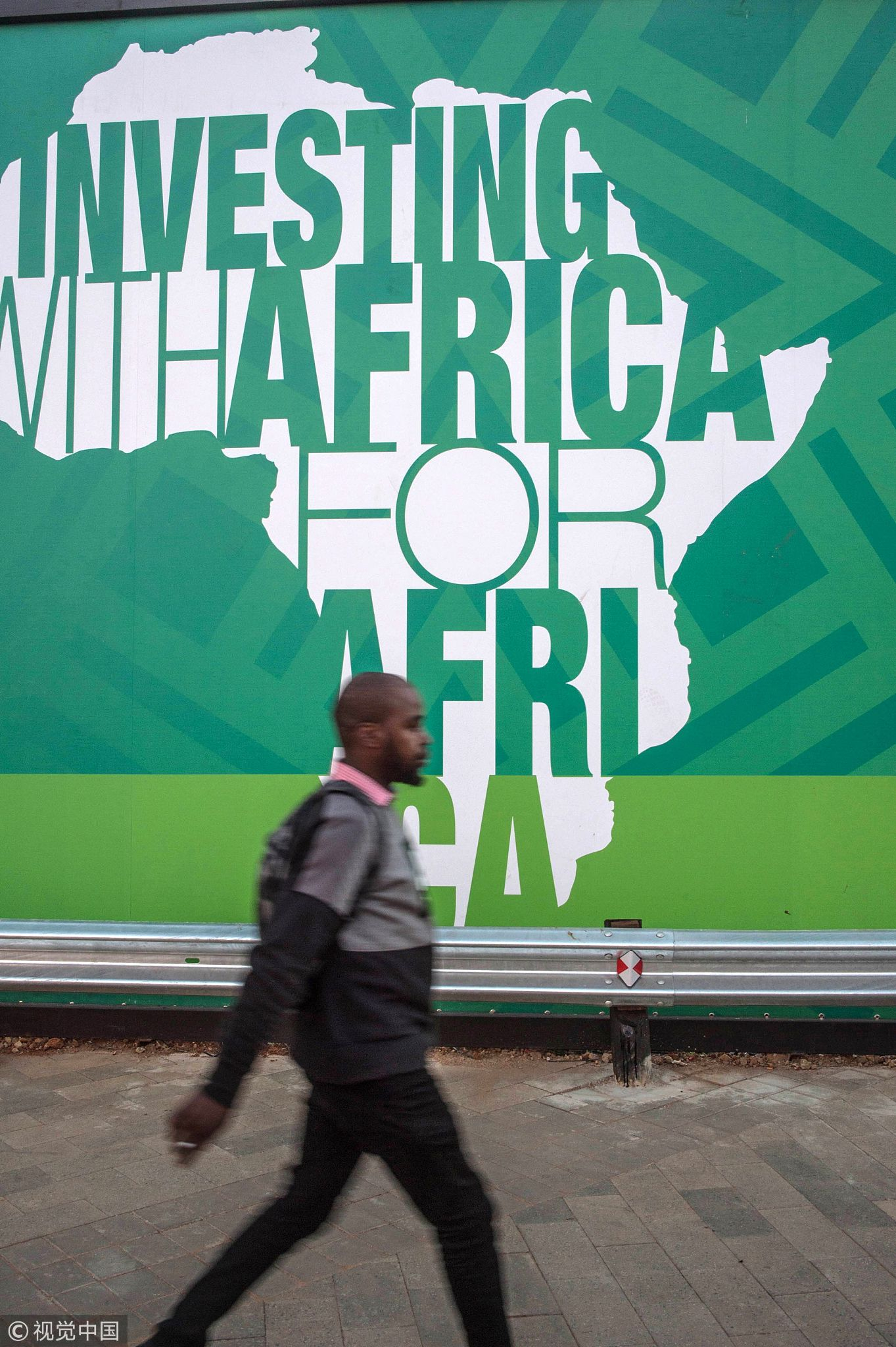
Opinions
12:29, 26-Jul-2018
Opinion: BRICS: Rapidly moving forward
Updated
12:11, 29-Jul-2018
Hisham AbuBakr Metwally

Editor's note: Hisham AbuBakr Metwally is the First Economist Researcher at the Central Department for Export & Import Policy under the Egyptian Ministry of Foreign Trade and Industry. The article reflects the author’s opinion, and not necessarily the views of CGTN.
On July 25 BRICS leaders started the 10th summit from South Africa, with the theme "BRICS in Africa: Collaboration for Inclusive Growth and Shared Prosperity in the Fourth Industrial Revolution". BRICS members strive towards the creation of an inclusive society and global partnerships that will bring prosperity to all humankind.
South Africa has invited the leaders of Argentina, Indonesia, Egypt, Jamaica, Turkey, UN Secretary General Mr. Antonio Guterres, under the sub-theme: BRICS Plus: Securing sustainable and inclusive growth for the prosperity of the Global South. These countries represent regional economic communities in the global south and the United Nations.
It's not the first time that South Africa has hosted a BRICS Summit as South Africa hosted the fifth BRICS Summit in March 2013. South Africa proposed new areas of BRICS cooperation, embodying a working group on peacekeeping, Vaccine Research Centre, BRICS gender and women’s forum, BRICS tourism track of cooperation.
BRICS economic cooperation is rapidly growing. Total intra-BRICS trade has grown rapidly with a value of 462 billion US dollars in 2017 from 204 billion US dollars in 2010.

10th BRICS Summit in South Africa./ VCG Photo
10th BRICS Summit in South Africa./ VCG Photo
The Xiamen Summit in 2017 saw the conclusion of four agreements in the areas of economic and trade cooperation, innovation cooperation, customs cooperation, strategic cooperation between the BRICS business council and the new development bank.
These agreements contribute to and support the realization of the shared objectives to which the BRICS leaders committed in 2015. BRICS members underlined their firm commitment to free trade and the centrality of a rules-based, transparent, non-discriminatory, multilateral trading system (MTS) as embodied in the World Trade Organization (WTO).
This includes opposing the new wave of protectionism and the systematic impact of unilateral measures that are incompatible with WTO rules and undermine global trade and economic growth.
In this regard, they reiterated that the WTO Dispute Settlement System is a cornerstone of the MTS as it is designed to enhance security and predictability in international trade.
Political and security cooperation between BRICS members is aimed at achieving peace, security, development, and cooperation for a more equitable and fair world.
BRICS provides opportunities for sharing policy advice and exchanges of best practices in terms of domestic and regional challenges as well as advancing the restructuring of the global political architecture so that it is more balanced, resting on the pillar of multilateralism.

June 4, 2018: (From L) Russian Foreign Affairs Minister Sergei Lavrov, Minister of Foreign Affairs of China Wang Yi, South African Minister of International Relations and Cooperation Lindiwe Sisulu, Brazil's Vice Minister of Foreign Affairs Marcos Galvao and India’s External Affairs Minister Sushma Swaraj pose for a picture during the BRICS Ministerial Meeting held at OR Tambo International Building in Pretoria, South Africa./ VCG Photo
June 4, 2018: (From L) Russian Foreign Affairs Minister Sergei Lavrov, Minister of Foreign Affairs of China Wang Yi, South African Minister of International Relations and Cooperation Lindiwe Sisulu, Brazil's Vice Minister of Foreign Affairs Marcos Galvao and India’s External Affairs Minister Sushma Swaraj pose for a picture during the BRICS Ministerial Meeting held at OR Tambo International Building in Pretoria, South Africa./ VCG Photo
Therefore, BRICS aims to reach harmonies with Africa’s Agenda 2063 and the 2030 Agenda for Sustainable Development.
As for BRICS' people-to-people exchanges, a lot of forums have taken place, including the Young Diplomats Forum, Parliamentarian Forum, Trade Union Forum, Civil BRICS, and the Media Forum.
Africa needs more from BRICS. Africa aims to achieve inclusive economic growth for its people. The continent objectives are strongly complemented by the accelerator growth potential that BRICS engagement has delivered to the continent. The potential for growing trade and investment, as well as intra Africa BRICS trade and investment, must be further maximized.
Despite the great efforts made by China, Africa needs more. If we look at the other members of the BRICS, we obviously find the contribution they made is far behind China's.
The BRICS block principles adopted and promulgated would be applied on the African ground. The 100 billion US dollars China has invested has been used for establishing six industrial zones and many infrastructure projects.
The World Bank reports that the number of people described as in extreme poverty is 644 million, representing 8.5 percent of the world's population of 7.6 billion.
If we look at the map of poverty distribution in the world according to the World Bank, we find that most of the very poor countries are on the African continent. Eleven African countries, which include South Sudan, Democratic Republic of Congo, Zambia, Congo, Central Africa Republic, Madagascar, Somalia, Chad, Niger, and Nigeria with a total population of 252 million, are classified as "poverty is rising".

July 25, 2018: A billboard in Sandton district of Johannesburg./ VCG Photo
July 25, 2018: A billboard in Sandton district of Johannesburg./ VCG Photo
Another 36 African countries are classified as "not able to reach the target at the current poverty escape rate". This means that the problem is deep and widespread in the African continent.
The world is moving faster. Russia, India, and Brazil should show more interest in African development and contribute effectively. Education and health sectors have not received adequate attention. The agricultural and industrial sectors still need more attention.
As for the African financial system, it is also lagging behind and needs a lot of development, which is a major obstacle in terms of investment and achieving a higher growth rate.
Take the agricultural sector as an example, African universities and research institutes suffer from funds shortages. Africa needs more technical institutes for the training of skilled labor.
Ultimately, we are grateful to China for its constructive initiatives, especially the Belt and Road Initiative, and the provision of loans and the construction of mega projects. But we want Russia, India, and Brazil to follow China's approach on the continent to provide more to achieve the sustainable development of Africa.

SITEMAP
Copyright © 2018 CGTN. Beijing ICP prepared NO.16065310-3
Copyright © 2018 CGTN. Beijing ICP prepared NO.16065310-3